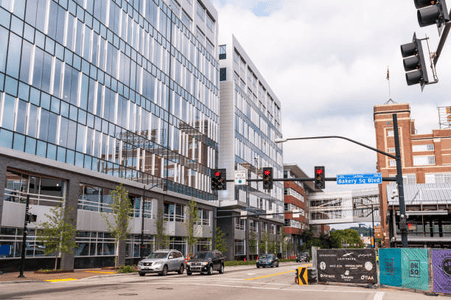Tax Breaks Fuel Conversion of Pittsburgh's Downtown Offices to Residential Units
Downtown Pittsburgh is facing unprecedented challenges in the wake of the COVID-19 pandemic, with the demand for commercial office space plummeting. In response to this crisis, Councilman Bobby Wilson has proposed a tax break aimed at incentivizing the conversion of downtown office buildings into residential spaces.
"Downtown is in serious financial trouble after the COVID-19 pandemic. The demand for commercial office space has dropped significantly," explained Councilman Wilson. "Because Downtown right now is in a crisis and is projected to get worse." The proposal aims to address this crisis by repurposing underutilized office buildings to meet the growing demand for urban residential units.
Councilwoman Erika Strassburger echoed the urgency of the situation, emphasizing that the city cannot afford to let Downtown fail. "Permanently diminished tax revenues from our central business district would severely restrict the quality and frequency of the services we provide in all 90 neighborhoods," she said. Recognizing the central role that Downtown plays in Pittsburgh's economic vitality, Strassburger emphasized the need for proactive measures to support its revitalization.
The proposed tax break would provide incentives for property owners to invest in the conversion of office buildings into residential units, thereby breathing new life into Downtown Pittsburgh. By encouraging mixed-use development, the city aims to create vibrant and sustainable urban neighborhoods that attract residents, businesses, and visitors alike.
In addition to addressing the immediate challenges posed by the decline in office space demand, the tax break proposal also aligns with broader efforts to promote urban revitalization and economic development in Pittsburgh. By repurposing vacant or underutilized buildings, the city can leverage its existing infrastructure to create new opportunities for growth and investment.
The conversion of office buildings to residential spaces offers multiple benefits for both property owners and the community at large. Not only does it help to address the oversupply of office space in Downtown Pittsburgh, but it also contributes to the creation of diverse and inclusive urban neighborhoods that support a range of housing needs.
Residential conversions have the potential to breathe new life into historic buildings and contribute to the preservation of Pittsburgh's architectural heritage. By repurposing these iconic structures for modern living, the city can honor its past while embracing its future as a dynamic and evolving urban center.
The proposed tax break is just one of several measures being considered to support Downtown Pittsburgh's recovery and revitalization. In addition to financial incentives, city officials are exploring strategies to enhance public spaces, improve transportation infrastructure, and attract new businesses and investments to the area.
As Pittsburgh navigates the post-pandemic landscape, the revitalization of Downtown remains a top priority for city leaders and stakeholders. By working together to implement creative solutions like the proposed tax break, Pittsburgh can emerge from the current crisis stronger, more resilient, and better positioned for future success.
Pittsburgh's Office Space Renaissance: Navigating Growth, Innovation, and Opportunity The city has evolved into a vibrant hub of innovation and economic opportunity. At the heart of its transformation lies the dynamic office space market, a key indicator of the city's economic health and vitality. In this article, we delve into the intricacies of Pittsburgh's office space market, exploring its current dynamics, major players, and future prospects.
Economic Overview: Pittsburgh's economy boasts a diverse range of industries, including healthcare, technology, education, and finance. With renowned institutions such as Carnegie Mellon University and the University of Pittsburgh driving innovation, the city has attracted a growing number of businesses seeking talent and resources.
Office Space Market Dynamics: The office space market in Pittsburgh is influenced by various factors, including supply and demand dynamics, rental rates, and vacancy rates. While Downtown Pittsburgh remains the epicenter of commercial activity, emerging submarkets such as the East End and Strip District are gaining traction, offering unique opportunities for tenants and investors.
Major Office Space Submarkets: Downtown Pittsburgh stands as the primary office space submarket, characterized by iconic skyscrapers, historic buildings, and a diverse mix of tenants. The area's accessibility, amenities, and cultural attractions make it a desirable destination for businesses of all sizes. Additionally, neighborhoods like Oakland, home to prestigious universities and research institutions, cater to the needs of the education and healthcare sectors.
Tenant Profiles: Pittsburgh's office space market accommodates a wide range of tenants, from Fortune 500 companies to startups and nonprofit organizations. Major corporations such as PNC Financial Services Group, UPMC, and Highmark Health anchor the market, driving demand for Class A office space. Startups and tech companies, attracted by the city's innovation ecosystem, contribute to the demand for flexible and creative workspaces.
Development Activity: The Pittsburgh skyline is undergoing a transformation with several prominent office space developments in the pipeline. Notable projects include the redevelopment of the former Civic Arena site in the Lower Hill District and the construction of new office towers in the Strip District and East End. These developments aim to meet the growing demand for modern, sustainable office space while revitalizing underutilized areas of the city.
Impact of COVID-19: The COVID-19 pandemic has reshaped the office space market landscape in Pittsburgh, prompting organizations to reevaluate their workspace needs and remote work policies. While some tenants have downsized or adopted hybrid work models, others have embraced flexible leasing arrangements and collaborative workspaces. As vaccination rates rise and businesses adapt to the new normal, the long-term impact of the pandemic on Pittsburgh's office space market remains to be seen.
Investment Trends: Pittsburgh's office space market continues to attract interest from investors seeking stable returns and value-add opportunities. Institutional investors, private equity firms, and real estate investment trusts (REITs) are actively acquiring office properties in the city, drawn by favorable market fundamentals and growth potential. Additionally, foreign investors, particularly from Asia and Europe, are increasingly exploring investment opportunities in Pittsburgh's office space market.
Technology and Innovation: Technology and innovation play a crucial role in shaping Pittsburgh's office space market, driving demand for modern, tech-enabled workspaces. The city's burgeoning tech sector, fueled by advancements in artificial intelligence, robotics, and autonomous vehicles, has led to the emergence of innovation districts and collaborative workspaces. Co-working spaces, incubators, and accelerators provide startups and entrepreneurs with the infrastructure and support they need to thrive.
Sustainability and Green Buildings: Sustainability is a growing priority in Pittsburgh's office space market, with developers and tenants alike prioritizing energy efficiency, green building certifications, and environmentally friendly practices. LEED-certified buildings, solar panels, and green roofs are becoming increasingly common, reflecting a commitment to reducing carbon emissions and mitigating climate change.
Future Outlook: Looking ahead, Pittsburgh's office space market is poised for continued growth and innovation. With a diverse economy, strong talent pool, and supportive business environment, the city offers a compelling value proposition for tenants and investors alike. As Pittsburgh embraces its role as a center of innovation and entrepreneurship, the office space market will play a pivotal role in shaping its future trajectory.
Pittsburgh's office space market is a dynamic and evolving landscape, reflective of the city's resilience, adaptability, and entrepreneurial spirit. As Pittsburgh positions itself for continued growth and prosperity, the office space market will remain a cornerstone of its economic development strategy, driving innovation, collaboration, and opportunity for years to come.
The proposed tax break to encourage the conversion of downtown office buildings to residential units represents a proactive and forward-thinking approach to revitalizing Downtown Pittsburgh. By leveraging existing assets and incentivizing investment, the city aims to create vibrant urban neighborhoods that thrive in the post-pandemic era. With strong leadership, strategic planning, and community engagement, Pittsburgh is poised to emerge as a model for urban renewal and resilience in the years to come.


